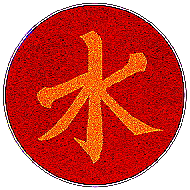





China is a country over thousands of
years old with roots buried in many different types of soil. One
of the types of soil that the roots of Chinese culture grow from is religion/philosophy.
These roots developed into the trunk of Confucianism. Confucianism
is a major influence in the background of Chinese culture. The bud
of Confucianism was planted by the teachings of Confucius. He believed
in the respect for tradition, practical piety and filial obligation. Confucius
endorsed a “paternalistic government” in which the leader is kind and honorable
and the subjects are respectful and obedient. Confucius did not intend
to found a religion, but express his political and spiritual views to China
(Berling).
Confucius was born in 551 B.C. His family
was of the lower aristocracy. The Five Classics, a collection of poems
of Chinese history, were what sowed the initial seed of Confucius’ beliefs.
At twenty-three years old he began teachings during the Zhou dynasty.
This was during a time of great social and technological change.
For Confucianism, this was a time of instability. Confucius traveled
to courts to convince lords of his ideals. His teachings were accepted
as laws and religious scripture. The practical piety, respect and
views of tradition that Confucius taught came from his intention to preserve
the foundering values in Chinese society (Berling).
Confucius and his followers handed down the beliefs
of Confucianism through nine ancient Chinese works. These writings are
divided into two groups: the Five Classics and the Four Books. The Five
Classics were written before Confucius’ time and are on proper conduct
and the historical account of feudal China. The Four Books are sayings
from Confucius and some of his disciples (Berling).
An important branch off of Confucianism is Confucius’
belief in human kindness, or the jen. “The jen, a supreme virtue representing
human qualities at their best, is the most distinguished figure in Confucianism
thought. In human relations, jen is manifested in Chung, or faithfulness
to oneself and others, and shu, or benevolence” (Liu). The jen is not a
particular value, but a combination of Confucius’ beliefs of all honorable
human virtues.
After the death of Confucius in 479 B.C., vines
of social and economic change hid the trunk of Confucianism and its presence
was forgotten. During the Han dynasty (206 B.C.-A.D. 220) the Confucian
works were restored and became an important basis in the political/philosophical
operations of the Chinese government. “Those who were running for
office were appointed to government positions based on their knowledge
of classic literature” (Liu). The stalk of Confucianism thus had a stable
standing and influence on Chinese intellectual and political life.
After the fall of the Han dynasty, Confucianism
was hidden again. This time the vines of Taoism and Buddhism covered
it. Also as before, however, it was uncovered and the ideals restored.
This was done by the Tang dynasty (618-907A.D.). Following the Tang
dynasty was the Song dynasty (960-1279 A.D.). Neo-Confucianism was created
during this time and was based on a mixture of Buddhist and Taoist elements.
Toward the end of the 19th century, scholars reformed Confucianism, in
order to base it on the original Confucian doctrines. However, the movements
failed, and Confucianism was branded as too narrow-minded and conservative.
Confucianism lost stability in China when the “paternalistic government”
and traditional family structure collapsed. This is because these
two characteristics were the foundation for Confucius’ ideal. Today,
Confucianism is still a major part of Chinese culture. The roots of Confucianism
have sprouted, grown, become strong, and are still secure in the soil of
Chinese religion (Liu).
The soil of religion out of which grows Confucianism
is old, deep, and rich. The roots of Confucianism have a powerful
hold on Chinese history and culture. The philosophy/religion founded
by Confucius is based on the respect for tradition, practical piety and
filial obligation. The trunk of Chinese culture, which is Confucianism,
is strong, powerful, and everlasting.